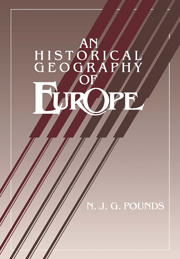Book contents
- Frontmatter
- Contents
- List of maps and diagrams
- Preface
- Introduction
- 1 The physical basis of European history
- Part I The classical civilizations
- Part II The Middle Ages
- Part III Modern Europe
- 8 Renaissance Europe
- 9 From the sixteenth to the nineteenth century
- Part IV The Industrial Revolution and after
- Index
9 - From the sixteenth to the nineteenth century
Published online by Cambridge University Press: 14 January 2010
- Frontmatter
- Contents
- List of maps and diagrams
- Preface
- Introduction
- 1 The physical basis of European history
- Part I The classical civilizations
- Part II The Middle Ages
- Part III Modern Europe
- 8 Renaissance Europe
- 9 From the sixteenth to the nineteenth century
- Part IV The Industrial Revolution and after
- Index
Summary
The three centuries from the early sixteenth to the end of the Napoleonic Wars saw changes of fundamental importance in the ways in which European peoples viewed themselves, their continent, and the world. When this period began the emperor Charles V had just triumphed over the French at Pavia (1525) and, in the minds of many, was about to restore an empire, both holy and Roman, and to unify Europe. When it ended, the bid for continental dominance by Napoleon had been shattered at Leipzig (1813) and Waterloo (1815), and Europe was set for a century of nationalism and economic growth.
A NEW WORLD
The changes which were achieved during this period can, for our purposes, be listed and discussed under five heads. First was the concept of nationalism, which was slowly and unevenly taking shape at this time. A nation is a body of people held together by a sense of belonging together. A common language and culture were important bonds. So also were a common historical tradition, the occupation of a well-defined territory, and, often enough, a common enemy. Many a nation has been forged in conflict with another and perhaps more powerful state.
- Type
- Chapter
- Information
- An Historical Geography of Europe , pp. 250 - 312Publisher: Cambridge University PressPrint publication year: 1990



